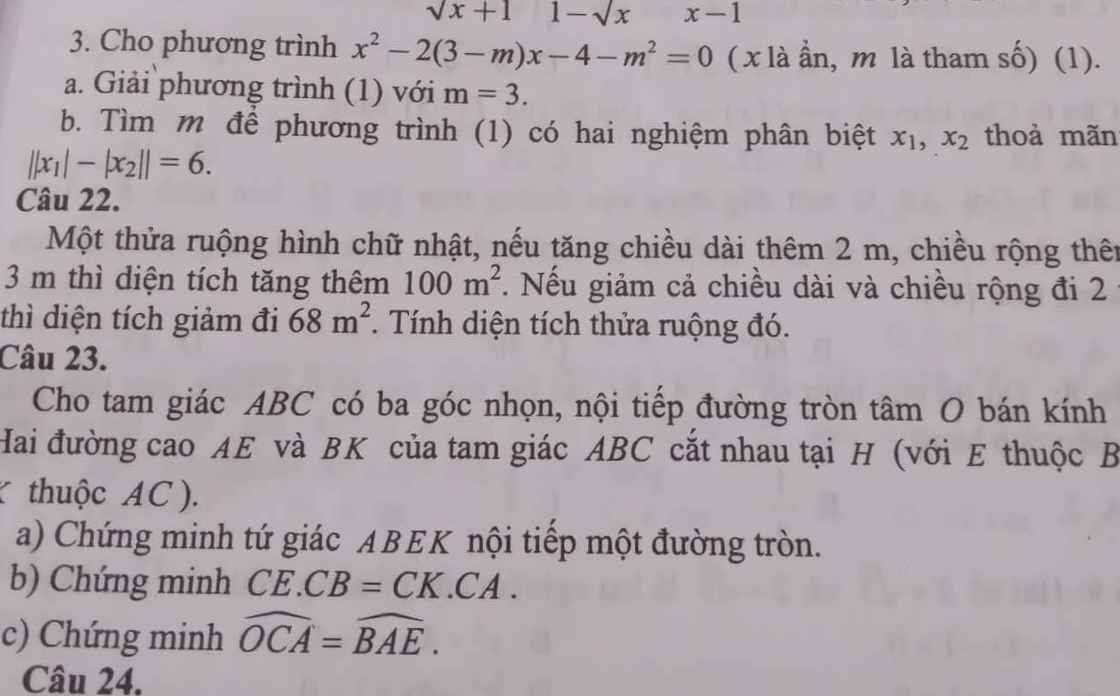Cho PT: \(2x^2-\left(m+1\right)x+m^2-m=0\). Tìm m để PT có 2 nghiệm x1, x2 sao cho biểu thức: A=(2\(x_1\)+1).(2\(x_2\)+1) có giá trị nhỏ nhất
Hãy nhập câu hỏi của bạn vào đây, nếu là tài khoản VIP, bạn sẽ được ưu tiên trả lời.


Có\(\Delta=4\left(m+1\right)^2-4\left(2m-3\right)=4m^2+16>0\forall m\)
=> pt luôn có hai nghiệm pb
Theo viet có: \(\left\{{}\begin{matrix}x_1+x_2=2\left(m+1\right)\\x_1x_2=2m-3\end{matrix}\right.\)
Có :\(P^2=\left(\dfrac{x_1+x_2}{x_1-x_2}\right)^2=\dfrac{4\left(m+1\right)^2}{\left(x_1+x_2\right)^2-4x_1x_2}\)
\(=\dfrac{4\left(m+1\right)^2}{4\left(m+1\right)^2-4\left(2m-3\right)}=\dfrac{4\left(m+1\right)^2}{4m^2+16}\)\(\ge0\)
\(\Rightarrow P\ge0\)
Dấu = xảy ra khi m=-1

a, Phương trình có hai nghiệm khi
\(\Delta'=m^2-2\left(m^2-2\right)=-m^2+4\ge0\Leftrightarrow-2\le m\le2\)
b, Theo định lí Viet \(\left\{{}\begin{matrix}x_1+x_2=-m\\x_1x_2=\dfrac{m^2-2}{2}\end{matrix}\right.\)
\(A=\left|2x_1x_2+x_1+x_2-4\right|\)
\(=\left|m^2-2-m-4\right|\)
\(=\left|\left(m-\dfrac{1}{2}\right)^2-\dfrac{25}{4}\right|\)
\(=\left|-\left(m-\dfrac{1}{2}\right)^2+\dfrac{25}{4}\right|\le\dfrac{25}{4}\)
\(maxA=\dfrac{25}{4}\Leftrightarrow m=\dfrac{1}{2}\)

\(\Delta'=m-1\ge0\Rightarrow m\ge1\)
Theo hệ thức Viet: \(\left\{{}\begin{matrix}x_1+x_2=2m\\x_1x_2=m^2-m+1\end{matrix}\right.\)
\(A=x_1^3+x_2^3-2\left(x_1+x_2\right)\)
\(=\left(x_1+x_2\right)^3-3x_1x_2\left(x_1+x_2\right)-2\left(x_1+x_2\right)\)
\(=8m^3-3.2m\left(m^2-m+1\right)-4m\)
\(=2m^3+6m^2-10m\)
\(=2\left(m^3+3m^2-5m+1\right)-2\)
\(=2\left(m-1\right)\left[\left(m^2-1\right)+4m\right]-2\)
Do \(m\ge1\Rightarrow\left\{{}\begin{matrix}m-1\ge0\\\left(m^2-1\right)+4m>0\end{matrix}\right.\)
\(\Rightarrow2\left(m-1\right)\left[\left(m^2-1\right)+4m\right]\ge0\)
\(\Rightarrow A\ge-2\)
\(A_{min}=-2\) khi \(m=1\)

1.
\(a+b+c=0\) nên pt luôn có 2 nghiệm
\(\left\{{}\begin{matrix}x_1+x_2=m\\x_1x_2=m-1\end{matrix}\right.\)
\(A=\dfrac{2x_1x_2+3}{x_1^2+x_2^2+2x_1x_2+2}=\dfrac{2x_1x_2+3}{\left(x_1+x_2\right)^2+2}=\dfrac{2\left(m-1\right)+3}{m^2+2}=\dfrac{2m+1}{m^2+2}\)
\(A=\dfrac{m^2+2-\left(m^2-2m+1\right)}{m^2+2}=1-\dfrac{\left(m-1\right)^2}{m^2+2}\le1\)
Dấu "=" xảy ra khi \(m=1\)
2.
\(\Delta=m^2-4\left(m-2\right)=\left(m-2\right)^2+4>0;\forall m\) nên pt luôn có 2 nghiệm pb
Theo Viet: \(\left\{{}\begin{matrix}x_1+x_2=m\\x_1x_2=m-2\end{matrix}\right.\)
\(\dfrac{\left(x_1^2-2\right)\left(x_2^2-2\right)}{\left(x_1-1\right)\left(x_2-1\right)}=4\Rightarrow\dfrac{\left(x_1x_2\right)^2-2\left(x_1^2+x_2^2\right)+4}{x_1x_2-\left(x_1+x_2\right)+1}=4\)
\(\Rightarrow\dfrac{\left(x_1x_2\right)^2-2\left(x_1+x_2\right)^2+4x_1x_2+4}{x_1x_2-\left(x_1+x_2\right)+1}=4\)
\(\Rightarrow\dfrac{\left(m-2\right)^2-2m^2+4\left(m-2\right)+4}{m-2-m+1}=4\)
\(\Rightarrow-m^2=-4\Rightarrow m=\pm2\)

`1)`
$a\big)\Delta=7^2-5.4.1=29>0\to$ PT có 2 nghiệm pb
$b\big)$
Theo Vi-ét: \(\left\{{}\begin{matrix}x_1+x_2=\dfrac{7}{5}\\x_1x_2=\dfrac{1}{5}\end{matrix}\right.\)
\(A=\left(x_1-\dfrac{7}{5}\right)x_1+\dfrac{1}{25x_2^2}+x_2^2\\ \Rightarrow A=\left(x_1-x_1-x_2\right)x_1+\left(\dfrac{1}{5}\right)^2\cdot\dfrac{1}{x_2^2}+x_2^2\\ \Rightarrow A=-x_1x_2+\left(x_1x_2\right)^2\cdot\dfrac{1}{x_2^2}+x_2^2\)
\(\Rightarrow A=-x_1x_2+x_1^2+x_2^2\\ \Rightarrow A=\left(x_1+x_2\right)^2-3x_1x_2\\ \Rightarrow A=\left(\dfrac{7}{5}\right)^2-3\cdot\dfrac{1}{5}=\dfrac{34}{25}\)

\(\Delta=m^2-4\left(m-2\right)=m^2-4m+8=\left(m-2\right)^2+4>0\)
Do đó: Phương trình luôn có hai nghiệm phân biệt
Ta có: \(A=x_1^2+x_2^2=\left(x_1+x_2\right)^2-2x_1x_2\)
\(=m^2-2\left(m-2\right)=m^2-2m+4=\left(m-1\right)^2+3\ge3\forall m\)
Dấu '=' xảy ra khi m=1

a: Khi m = -4 thì:
\(x^2-5x+\left(-4\right)-2=0\)
\(\Leftrightarrow x^2-5x-6=0\)
\(\Delta=\left(-5\right)^2-5\cdot1\cdot\left(-6\right)=49\Rightarrow\sqrt{\Delta}=\sqrt{49}=7>0\)
Pt có 2 nghiệm phân biệt:
\(x_1=\dfrac{5+7}{2}=6;x_2=\dfrac{5-7}{2}=-1\)

\(\Delta'=\left(m-1\right)^2-2\left(m^2-1\right)=-m^2-2m+3>0\)
\(\Rightarrow-3< m< 1\)
Khi đó theo hệ thức Viet: \(\left\{{}\begin{matrix}x_1+x_2=-\left(m-1\right)\\x_1x_2=\dfrac{m^2-1}{2}\end{matrix}\right.\)
\(P=\left(x_1-x_2\right)^2=x_1^2+x_2^2-2x_1x_2\)
\(P=x_1^2+x_2^2+2x_1x_2-4x_1x_2=\left(x_1+x_2\right)^2-4x_1x_2\)
\(P=\left(m-1\right)^2-4\left(\dfrac{m^2-1}{2}\right)\)
\(P=-m^2-2m+3=-\left(m^2+2m+1\right)+4\)
\(P=-\left(m+1\right)^2+4\le4\)
\(P_{max}=4\) khi \(m+1=0\Leftrightarrow m=-1\) (thỏa mãn)
